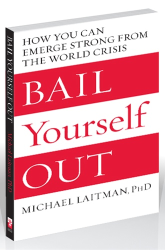“Half of the modern drugs could well be thrown out of the window, except that the birds might eat them.”
–Dr. Martin Henry Fischer
The Secret to Get Every Doctor to Care of their Patients
Thousands of years ago, in ancient China, medicine was practiced quite opposite to the way it is practiced today. In those days, every household put a vase outside its door. As the healer made his daily rounds through the houses of the village, he would look into each vase. If there was a coin inside it, he took the coin and went on his way, knowing that everyone in the house was healthy.
If the vase was empty, the healer knew that someone inside was ill. He would enter and treat the patient to the best of his ability. When the sick person was well again, the daily payment of a coin resumed.
This was a simple method that guaranteed the healer’s interest in the health of his patients, for his payments continued as long as the patient was well. To maximize his profits, the healer needed the people under his supervision to stay healthy as much of the time as possible. For this reason, the healer would walk around the village in his free time, advise people on healthy living, and reprimand those who were negligent. If a person was stubborn and refused to lead a wholesome way of life, the healer would exclude him from his rounds and refuse him medical attention when he needed it.
This simple method guaranteed that both patient and healer had a vested interest in keeping healthy—a stark difference from our present approach to medicine.
Why the Modern Health Care System Wants You to be Ill
In modern medicine, a physician’s salary is comprised of how many patients are treated daily, how many commissions are given by drug manufacturers, and how high the doctor’s rates are for services. Under private medicine, wealthier patients pay more for better doctors, which produces a skew in the quality of care available to those in lower income brackets.
In addition, today’s system penalizes a physician whose patients are healthy. In fact, the practitioner could theoretically starve to death or get a pink slip precisely because he or she has succeeded in keeping people healthy!
The drug companies, which we hail whenever they announce a new drug or treatment for an illness, are trapped in that same circle. If they produced a drug that actually made people well, they would go bankrupt. Hence, it is in their interest that we remain alive and unwell. The whole system—hospitals, drug companies, doctors, nurses, and caretakers—actually benefits from perpetuating our ill health. It is the only way healthcare workers can sustain themselves.
But this reality is not the fault of any one person. Doctors are not evil people, at least no more than you and I. They are trapped in a system that has been built to maximize profit instead of health and well-being. As a result, patients—ordinary people—must protect themselves by purchasing costly health insurance and depend on the judicial system in cases of malpractice.
This, in turn, forces physicians to buy costly insurance policies to protect themselves against malpractice suits. This whole system reflects a very sick situation!
And what evildoer has created this broken system? It is our own ignorance of nature. Indeed, the healthcare system is perhaps where the symptoms of seeing only one half of reality manifest most acutely.
Who Else Wants a Health Care System that Maintains Balance Like the Human Body?
Clearly, we cannot emulate the ancient Chinese healthcare system. We have grown too entangled in our egotistical systems to untangle them without causing the whole system to collapse. The Chinese model, however, can serve as an example of how simple, inexpensive, and health-promoting our healthcare system should be.
No one understands balance better than physicians. In medicine, this state is called “homeostasis.” Webster’s Dictionary defines it as “a relatively stable state of equilibrium or a tendency toward such a state between the different but interdependent elements or groups of elements of an organism.”
In medicine, it is expressed as the last part of this definition: “different but interdependent elements or groups of elements of an organism.”
Homeostasis is also what defines health or illness within the body. Thus, physicians can easily grasp the concept. Hence, studying both of nature’s qualities—giving and receiving—is the first thing to do. This will create an awareness and a sense of urgency to change today’s lame system.
Anyone who ever studied biology knows that a healthy cell gives its utmost support to its host organism, and in return receives its sustenance and protection from the organism. A cancerous cell does just the opposite—it takes all it can from the organism and gives it nothing in return. As a result, the host is consumed and dies along with the cancer.
For this reason, researchers and physicians are the best candidates for a conscious change of heart. They will understand the need for mutual guarantee among all members of humanity better than anyone. And they will also understand that the days of today’s system are numbered, and that the need for change is imminent and pressing.
Just like the immune system in a body, a healthcare workers’ job is to keep people healthy, as well as to treat them once they are sick. And the workers’ reward for people’s health should be the praise of society. Of course, they should receive proper wages to allow them a life of dignity, but beyond that, their reward should come from society’s recognition.
As with every other type of change, its success depends on the social atmosphere. In an atmosphere of self-centeredness, this shift will never succeed. But in an atmosphere of camaraderie and trust, it is certain to succeed.
Because of the complexity of today’s healthcare system, it is vital that all its participants will not only be aware of the need for change, but will want to realize it simultaneously. Then, just as the symptoms of humanity’s illness appear most acutely in the healthcare system, healing will manifest itself most dramatically in precisely that system.
Why Sustainability Requires Sustainable Relationships between People and Nature
“Till now man has been up against Nature; from now on he will be up against his own nature.”
–Dennis Gabor, Inventing the Future, 1964
On the surface, ecology should be the easiest topic to address in this book. Make all cars electric, all power plants solar or wind powered, and make all plastic recyclable. Then, voila, the world is a green, beautiful, and cool place once again. But if it’s that easy, why haven’t we succeeded so far?
There are many answers to that question. The most obvious is that we have been so busy making money from fossil fuels and cheap plastics, we have put everything else aside, including the planet—our home and that of our children. Another plausible answer is that solar energy is simply inefficient and costly, and using it would raise the price of electricity so high, it would be too expensive for people to use.
Yet, all these problems focus on the technicalities and leave aside the real issue—our indifference to the future of our earthly home and our intolerance of the needs of others. In short, as Dr. Gabor so plainly said, the real problem is human nature.
Today, our inaction about the state of our planet is almost criminal: we are subjecting parts of the world to floods that ruin the crops they live on, and we are afflicting other parts of the world with such severe droughts that people are simply dying of thirst. So why are we so heartless toward nature and towards ourselves?
The answer is that we have forgotten our primordial root—the balance of forces between the desire to give and the desire to receive. We see this balance in all of nature’s levels: the inanimate, vegetative, and animal. We humans consider ourselves above nature, perhaps not in theory but certainly in practice. But the truth is that we are not above it at all. We are very much a part of it.
The Practical Guide to How Humanity Can Achieve Balance with Itself and Nature
We are the speaking level, the most highly developed level of nature. As such, we are also the most influential part of it: our actions affect all other levels of nature. But more important, our internal condition affects the rest of nature just as powerfully as our actions affect it, if not more. And when our internal condition is one of imbalance, egotism, and unawareness of the giving force in nature, the whole of nature falls into egotism and unawareness of the giving force, and everyone suffers—plants, animals, and people.
For this reason, even if we all drive electric vehicles and use only energy from renewable sources, the world will not become more welcoming. What will make the difference is if we recognize the desire to give, and learn how to incorporate it into our lives.
Consider this: when we suffer from such a mild annoyance as a common cold, it affects our whole body. We cannot breathe easily, we lose our appetites, our temperatures rise, we become weak, and our concentration drops. Similarly, the world is like a small village, and everything we do affects everyone and everything else. Hence, we must learn about nature’s balance at the most fundamental level—the level of desires—and implement it in our lives.
This does not mean that if I help an old lady cross the street, a hurricane will stop blowing in the Atlantic. It means that if we all think of everyone else’s good at least as much as we think of our own, because we want to get to know the giving force, then all of us together will make suffering a thing of the past.
It may sound fantastic, but if you remember that the only inharmonious and disruptive element in nature is us, it makes perfect sense that when we are united in harmony and in equilibrium, the hell that our planet is becoming will reverse itself.
And the most beautiful part about it is that we will not have to do a thing to make this happen. It will happen by itself, because our newly balanced senses will guide us correctly as to how to manage ourselves and create a heaven on earth.
This is as true for ecology as it is for economy, education, health, and every other aspect of our lives.
 “Little Known Ways Art Can Transform the World” is based on the book, Bail Yourself Out: How You Can Emerge Strong from the World Crisis by Dr. Michael Laitman.
“Little Known Ways Art Can Transform the World” is based on the book, Bail Yourself Out: How You Can Emerge Strong from the World Crisis by Dr. Michael Laitman.

